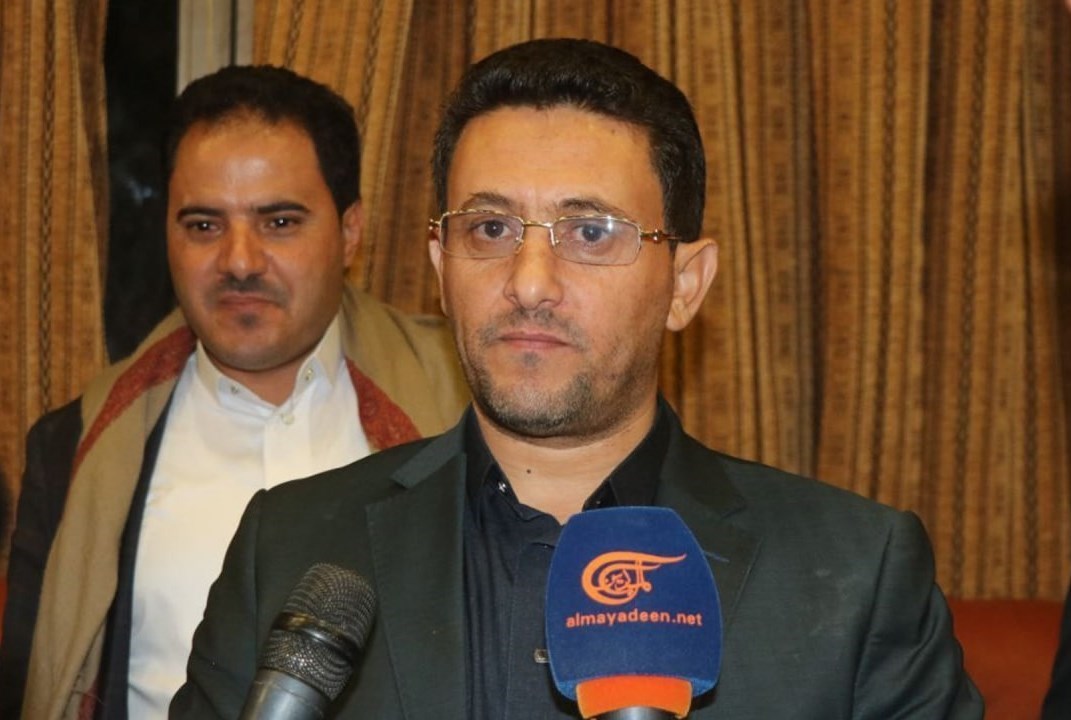The supposed exchange deal involves 1,400 prisoners.
-

The head of the National Committee for Prisoners’ Affairs in Sanaa, Abdul Qadir Al-Murtada (SABA)
The head of the National Committee for Prisoners’ Affairs in Sanaa, Abdul Qadir Al-Murtada, announced that the Saudi-backed Yemeni government and the Sanaa government, a month ago, were “too close to reaching an agreement to implement a deal to exchange 1,400 prisoners from both sides, but mercenaries stood in the way.”
In an interview for the Yemeni Al-Masirah channel, Al-Murtada indicated that Sanaa told the mercenaries that “it had no problem with including the leader of Al-Islah Party, Muhammad Qahtan, in the new deal, in exchange for a group of its prisoners, but they refused.”
“The mercenaries use the prisoners’ file for extortion, and they are not serious about the exchange,” Al-Murtada confirmed, denying that “any of the enemy’s prisoners in Sanaa has been tortured.”
He also saw that “the allegations of mercenaries about torturing their captives are to cover up their crimes against our captives,” confirming the possession of “documents that prove they had committed crimes against the captives, through torture and health neglect.”
Al-Murtada called on all international organizations to “take immediate action and visit all prisons” and expressed readiness to open all prisons for them to verify the conditions of the prisoners in Sanaa.
While the Sanaa government asked the United Nations to “visit all prisons and show the results to the public opinion,” Al-Murtada pointed out that “the mercenaries are concerned about exposing the way they treat prisoners in their own prisons in the event that mutual visits take place.”
According to him, “The UN approach toward uncovering crimes against the prisoners is weak,” insisting that “we have not seen any action in that direction.”
The file of the prisoners is still “stagnant, and the UN has not put pressure on the aggression party and the mercenaries to implement what was agreed upon.”
Coalition prisons still hold 1,200 Yemenis, including children, women
Insan Organization for Rights and Liberties in Sanaa revealed in May that the number of civilians abducted by the coalition of aggression reached nearly 1,200, including women and children, between November 2021 and May 2023.
The exchange of prisoners between Sanaa and Riyadh came as part of the implementation of the agreement reached in talks between the parties to the Yemeni conflict in the Swiss capital, Bern, last March.
In April, a major prisoner exchange took place over three days while diplomatic efforts to achieve a long-term truce were stepped up.
No agreement reached during Jordan talks on prisoner swap deal: Sanaa
Last month, Al-Murtada told Al Mayadeen that the round of talks in Jordan over a potential prisoner exchange ended without reaching any agreement.
Talks were taking place in the Jordanian capital, Amman, between the Saudi-backed Yemeni government and the Sanaa government, under the auspices of the United Nations and the International Committee of the Red Cross (ICRC), with the aim of preparing for a future prisoner exchange, as per the ICRC.
The UN envoy’s office revealed at the time that the Amman negotiations were a continuation of an agreement reached by the two parties in Stockholm five years prior.
Al-Murtada had affirmed that “the Americans have been obstructing peace throughout the previous periods,” adding that the US is always looking to block any progress, as it seeks to plant obstacles in every negotiation round related to the prisoner file.
It is noteworthy that in recent months, the Sultanate of Oman stepped up efforts to stop the aggression against Yemen and lift the unlawful siege imposed on the country by mediating a peace deal between Sanaa and the Saudi-backed Yemeni government.
However, due to Western obstruction, Saudi and Yemeni negotiators failed to agree on a new truce.
This post was originally published on this site be sure to check out more of their content.






